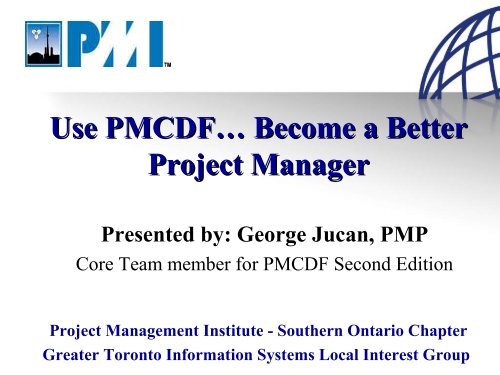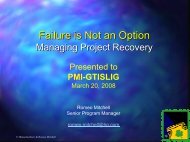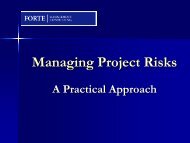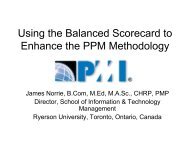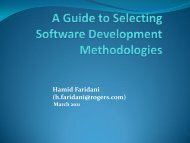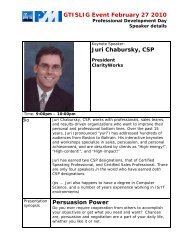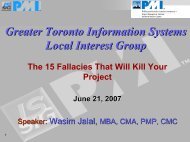Use PMCDF ... Become a Better Project Manager - gt islig
Use PMCDF ... Become a Better Project Manager - gt islig
Use PMCDF ... Become a Better Project Manager - gt islig
You also want an ePaper? Increase the reach of your titles
YUMPU automatically turns print PDFs into web optimized ePapers that Google loves.
<strong>Use</strong> <strong>PMCDF</strong>… <strong>Become</strong> a <strong>Better</strong><br />
<strong>Project</strong> <strong>Manager</strong><br />
Presented by: George Jucan, PMP<br />
Core Team member for <strong>PMCDF</strong> Second Edition<br />
<strong>Project</strong> Management Institute - Southern Ontario Chapter<br />
Greater Toronto Information Systems Local Interest Group
PMI Standards<br />
<strong>Project</strong>s<br />
• A Guide to the <strong>Project</strong> Management Body of Knowledge (PMBOK ® Guide) - Third Edition<br />
• Construction Extension to the PMBOK ® Guide - 2000 Edition<br />
• Government Extension to the PMBOK ® Guide Third Edition<br />
• Practice Standard for Earned Value Management<br />
• Practice Standard for <strong>Project</strong> Configuration Management<br />
• Practice Standard for Work Breakdown Structures - Second Edition<br />
Programs<br />
• The Standard for Program Management<br />
People<br />
• <strong>Project</strong> <strong>Manager</strong> Competency Development Framework (<strong>PMCDF</strong>) - Second Edition<br />
Organizations<br />
• Organizational <strong>Project</strong> Management Maturity Model (OPM3 ® )<br />
• The Standard for Portfolio Management
Alignment with PMI Standards<br />
PMBOK ® Guide<br />
Third Edition<br />
PMP ® Role Delineation Study and<br />
Career Framework<br />
PMCD Framework<br />
First Edition<br />
Program/ Portfolio<br />
Management Standards<br />
<strong>Project</strong><br />
<strong>Manager</strong><br />
Competency<br />
Development<br />
Framework<br />
Combined<br />
Standards Glossary/<br />
PM Lexicon<br />
PMI Code of<br />
Professional<br />
Conduct<br />
PMP ®<br />
Examination Specification<br />
OPM3 ®
<strong>PMCDF</strong> - Second Edition<br />
Vision:<br />
We provide the basis for<br />
individuals and organizations to<br />
raise their competence in <strong>Project</strong><br />
Management and raise the level<br />
of professionalism within PMI
Target Audience<br />
• <strong>Project</strong> <strong>Manager</strong>s<br />
• <strong>Manager</strong>s of project managers<br />
• Members of a <strong>Project</strong> Management Office<br />
• <strong>Manager</strong>s responsible for establishing and developing<br />
<strong>Project</strong> <strong>Manager</strong> competence<br />
• Educators teaching project management and other<br />
related subjects<br />
• Trainers developing project management educational<br />
programs<br />
• Consultants in project/program management<br />
• Human Resource teams<br />
• Senior Management
<strong>PMCDF</strong> Overview<br />
• Provide support to individuals and organizations<br />
• Provide guidance for the assessment of <strong>Project</strong><br />
<strong>Manager</strong>s who:<br />
– Demonstrated necessary project management knowledge by<br />
passing a suitable exam (e.g. PMP)<br />
– Are able to provide evidence of performance and personal<br />
competence<br />
– Have 3-4 years of project management experience<br />
• Based on a generic project manager (industry agnostic)<br />
• Supported by data from PMP Examination<br />
Specification
<strong>Project</strong> Management Competence
What is “Competence”<br />
• The quality or state of […] having requisite or adequate ability<br />
or qualities. (Merriam-Webster)<br />
• Having the skills or knowledge to do something well enough to<br />
meet a basic standard (Cambridge)<br />
• The quality or extent of […] having the necessary skill or<br />
knowledge to do something successfully. (Oxford)<br />
• Competence is a standardized requirement for an individual to<br />
properly perform a specific job. It encompasses a combination<br />
of knowledge, skills and behaviour utilised to improve<br />
performance. More generally, competence is the state or quality<br />
of being adequately or well qualified, having the ability to<br />
perform a specific role. (wikipedia)
<strong>Project</strong> Management Competence<br />
<strong>Project</strong> management competence is the demonstrated<br />
ability to perform activities within a project environment<br />
that leads to expected outcomes based on defined and<br />
accepted standards.<br />
A competent project manager consistently applies<br />
his/her knowledge, skills and personal characteristics to<br />
deliver projects that meet stakeholders’ requirements.
Dimensions of PM Competence<br />
• Knowledge - what the project manager knows about the<br />
application of processes, tools and techniques to project<br />
activities.<br />
• Performance - how the project manager<br />
applies project management knowledge<br />
to meet the project requirements.<br />
• Personal - how the project manager<br />
behaves when performing activities<br />
within the project environment; their<br />
attitudes and core personality<br />
characteristics.
Knowledge Competence<br />
• What a person knows about project management<br />
discipline and how projects should be planned,<br />
executed and controlled<br />
• Required knowledge is defined by the PMP ®<br />
Examination Specification<br />
• A project manager demonstrates knowledge by<br />
passing passing an appropriately credentialed<br />
assessment (e.g. PMP ® )
<strong>PMCDF</strong> Competencies
Performance Competence
Performance Competence<br />
• What is the person able to do by applying their project<br />
management knowledge<br />
• <strong>Project</strong> manager’s performance can be demonstrated by<br />
assessing project related outcomes<br />
• The ultimate evidence is successful<br />
delivery of projects<br />
• A competent project manager<br />
can provide evidence of<br />
compliance with defined<br />
performance criteria
Structure<br />
5 Units<br />
34 Elements<br />
131 Competence Criteria<br />
One to one mapping between Competence Criteria and Evidences
Alignment<br />
Units: Defined by PMP Examination Specification<br />
(Performance Domains)<br />
Elements: Aligned with the PMP Examination Specification<br />
(outcomes the PM should deliver)<br />
Criteria: Defined by the <strong>PMCDF</strong> update team using the 2003<br />
document and the PMP Exam Spec (specific actions to<br />
achieve desired outcomes)<br />
Evidences: Defined by the <strong>PMCDF</strong> update team (material<br />
results of PM actions)
Units of Performance Competence<br />
Initiating: authorize and define the scope of a new project.<br />
Planning: define and mature the project scope, develop the project<br />
management plan, and identify and schedule the project activities.<br />
Executing: performing the work defined in the project<br />
management plan to accomplish the project objectives under the<br />
project scope statement.<br />
Monitoring and Controlling: compare actual performance with<br />
planned performance, analyze variances, assess trends to effect<br />
process improvements, evaluate possible alternatives and<br />
implement appropriate corrective action as needed.<br />
Closing: formally terminate a project and transfer the completed<br />
product to operations or to close a cancelled project.
Performance Competence Elements<br />
PM Performance Competence<br />
Initiating a <strong>Project</strong><br />
<strong>Project</strong> aligned with<br />
organization objectives<br />
and customer<br />
needs<br />
Scope statement reflects<br />
organization and<br />
customer needs and<br />
expectations<br />
High level risks/<br />
assumptions/<br />
constraints<br />
are understood<br />
Key stakeholders<br />
needs are understood<br />
Draft project charter<br />
available<br />
Planning a <strong>Project</strong><br />
<strong>Project</strong> scope agreed<br />
to address project<br />
deliverables<br />
<strong>Project</strong> schedule<br />
developed<br />
Cost management plan<br />
developed<br />
<strong>Project</strong> Team identified<br />
with agreed roles and<br />
responsibilities<br />
Communication<br />
activities approved<br />
Quality planned<br />
Risk plan approved<br />
Executing a <strong>Project</strong><br />
<strong>Project</strong> goals<br />
achieved through<br />
effective project plan<br />
execution<br />
<strong>Project</strong> stakeholders’<br />
expectations managed<br />
successfully<br />
Human resources<br />
available when<br />
required<br />
Tasks successfully<br />
completed as planned<br />
Quality managed<br />
Material resources<br />
available as required<br />
Monitoring &<br />
Controlling a <strong>Project</strong><br />
<strong>Project</strong> tracked and<br />
status communicated to<br />
relevant stakeholders<br />
Change is managed<br />
Quality controlled<br />
Risks managed to<br />
ensure minimized<br />
impact on project<br />
outcomes<br />
<strong>Project</strong> team managed<br />
Sellers managed<br />
Closing a <strong>Project</strong><br />
<strong>Project</strong> outcomes<br />
accepted by all<br />
stakeholders<br />
<strong>Project</strong> formally<br />
closed<br />
<strong>Project</strong> resources<br />
released<br />
Stakeholder<br />
perceptions<br />
measured and<br />
analyzed<br />
<strong>Project</strong> charter approved<br />
Change management<br />
processes established<br />
Materials procured<br />
Approved project plan
Criteria and Evidences<br />
Element<br />
High level risks, assumptions and constraints are understood<br />
Performance Criteria<br />
Types of evidence<br />
.1 Establishes the project’s high<br />
level assumptions and<br />
Constraints<br />
.2 Identifies and analyses<br />
the project’s high level risks<br />
Documented assumptions<br />
and constraints<br />
Documented list of<br />
analyzed high level risks<br />
reviewed with key stakeholders<br />
Performance Criteria<br />
Types of Evidence
Personal Competence
Personal Competence<br />
• Personal Competencies are those behaviors, attitudes<br />
and core personality characteristics that contribute to a<br />
person’s ability to manage projects.<br />
• Personal competence enable the<br />
project manager to effectively<br />
use knowledge and performance<br />
competencies<br />
• Demonstrated by how the<br />
person behaves while<br />
delivering the project
Structure<br />
6 Units<br />
30 Elements<br />
134 Competence Criteria<br />
One to many mapping between Competence Criteria and Evidences
Alignment<br />
Units: Derived from 2003 document, Code of Ethics and<br />
Professional Conduct and PMP Examination Specification<br />
Elements: Derived from 2003 document, PMBOK, PMP<br />
Exam Specification, Code of Ethics and Professional Conduct<br />
Criteria: Defined by the <strong>PMCDF</strong> update team using the 2003<br />
document, PMBOK, PMP Exam Spec and Code of Ethics and<br />
Professional Conduct<br />
Evidences: Defined by the <strong>PMCDF</strong> update team (material<br />
results that demonstrate, alone or in conjunction with other<br />
evidences, the presence of the desired behavior)
Units of Personal Competence<br />
Communicating: Effectively exchanges accurate, appropriate and relevant<br />
information with stakeholders using suitable methods.<br />
Leading: Guides, inspires and motivates team members and other project<br />
stakeholders to manage and overcome issues to effectively achieve project<br />
objectives.<br />
Managing: Effectively administers the project through deployment and use of<br />
human, financial, material, intellectual and intangible resources.<br />
Cognitive Ability: Applies an appropriate depth of perception, discernment and<br />
judgment to effectively direct a project in a changing and evolving environment.<br />
Effectiveness: Produces desired results by using appropriate resources, tools<br />
and techniques in all project management activities.<br />
Professionalism: Conforms to an ethical behavior governed by responsibility,<br />
respect, fairness and honesty in the practice of project management
Personal Competence Elements
Criteria and Evidences<br />
Element<br />
Actively listens, understands and responds to stakeholders<br />
1 Actively listens<br />
Survey results from stakeholders<br />
Documented observations<br />
from communication<br />
Documented feedback on<br />
empathy and understanding<br />
towards others point of view<br />
Performance Criteria<br />
Types of Evidence
Developing Competence As A<br />
<strong>Project</strong> <strong>Manager</strong>
<strong>PMCDF</strong> Competencies
Supporting Competencies<br />
• PMI Standards are “applicable to most projects most of<br />
the time”, so they must be generic<br />
• PM also needs technical skills that are particularly<br />
relevant to that industry or covered by specific domain,<br />
regulatory or legal requirements<br />
• To be successful in an<br />
organizational context<br />
the PM also needs to<br />
understand the corporate<br />
culture, environment,<br />
politics etc.
Competence Development Process
Competence Assessment<br />
• Performed by the individual or by the organization (e.g.<br />
by PMO)<br />
• Based on evidences against the PMCD Framework<br />
performance criteria<br />
• Could use different levels of detail for each competence<br />
area (unit, element or criteria)<br />
• The organization may prescribe qualitative, quantitative<br />
and interpretative methods to be used<br />
• When using a holistic approach, stren<strong>gt</strong>h in one area<br />
could obscure one or more gaps in other areas
Assessment Rigor<br />
• Low Rigor – typically involves casual self-assessment,<br />
or informal assessment against the competence criteria.<br />
• Medium Rigor – more detailed, usually done by a<br />
manager or peer, adding external feedback to<br />
individual’s perspective to create a 360º view.<br />
• High Rigor – in-depth assessment, usually performed by<br />
qualified independent assessors, involving analysis of<br />
several recent projects to gather relevant evidence.
Development Plan<br />
• Individual stren<strong>gt</strong>hs and areas to be addressed<br />
• Prioritized development areas<br />
• Using different methods<br />
– Mentoring<br />
– Coaching<br />
– Peer to peer<br />
– Role playing<br />
– On the job training<br />
– Training – group, in-house, CBT, individual<br />
– PMI Education programs
Development Plan Example<br />
Line<br />
No.<br />
. . .<br />
21<br />
22<br />
. . .<br />
Label<br />
(Known as)<br />
Action to<br />
Influence<br />
The level of<br />
detail<br />
required to<br />
define the<br />
project<br />
scope<br />
<strong>PMCDF</strong><br />
Reference<br />
Personal<br />
2.5.1<br />
Performan<br />
ce 2.1.1<br />
Learning Outcome<br />
(Behavior) required<br />
Continually<br />
reviewing where<br />
persuasion is likely<br />
to be needed and<br />
the method most<br />
likely to succeed<br />
Develop the use of<br />
WBS to breakdown<br />
project scope<br />
Learning<br />
activity<br />
- Type<br />
Mentoring<br />
/Coaching<br />
Training<br />
course on<br />
use of<br />
WBS<br />
Target<br />
Date<br />
Dec<br />
2007<br />
Oct<br />
2006<br />
Mentor<br />
Name<br />
Arthur<br />
Wright<br />
n/a<br />
Pre -<br />
Development<br />
Below<br />
Expectation<br />
June 16 2006<br />
Below<br />
Expectation<br />
June 16 2006<br />
Level to be<br />
achieved<br />
Post<br />
Development<br />
Exceeds<br />
Expectations<br />
Dec 5 2007<br />
Meets<br />
Expectations<br />
Oct 2006
Execute Plan<br />
The project manager needs to execute this plan just<br />
as a project manager would execute a project plan.<br />
• Plan owned by the PM<br />
• Medium and long term goals<br />
• In parallel with project work<br />
• Engage support from others<br />
• Monitor progress and take corrective actions
Evaluate Plan<br />
• Iterative process to develop competence as a project<br />
manager<br />
• Each iteration of the Competence Development Plan<br />
should be treated as a project in itself.<br />
• As with any project there needs to be a formal review<br />
of plan’s success<br />
• Questions that need to be asked include:<br />
– Was the plan suitable<br />
– Did the plan deliver the outcomes needed<br />
– Was there sufficient support for the development plan<br />
– Were there activities that should have provided better outcomes<br />
– Can others now use the same plan
What’s in it for me
Career Puzzle
A Guide to the Top<br />
PMO <strong>Manager</strong><br />
Portfolio <strong>Manager</strong><br />
SME <strong>Project</strong> <strong>Manager</strong> <strong>Project</strong> Director Program <strong>Manager</strong><br />
Sn. <strong>Project</strong> <strong>Manager</strong><br />
Executive<br />
Management<br />
Organizational<br />
Management<br />
Good<br />
luck!<br />
Organizational<br />
Management<br />
Technical<br />
Leads<br />
Admin staff<br />
<strong>Project</strong> <strong>Manager</strong><br />
<strong>Project</strong> Leader<br />
<strong>Project</strong> Coordinator<br />
<strong>Project</strong> Assistant<br />
<strong>Project</strong> Controller<br />
P<br />
M<br />
C<br />
D<br />
F
Summary
Summary<br />
• The PMCD Framework defines the Performance and<br />
Personal Competencies required for a competent<br />
project manager.<br />
• The <strong>PMCDF</strong>-Second Edition was developed to<br />
provide both individuals and organizations with<br />
guidance on how to assess, plan and manage the<br />
professional development of a <strong>Project</strong> <strong>Manager</strong><br />
• Each organization might customize the framework to<br />
its own needs.
Summary<br />
• Recommends an iterative process to develop<br />
competence as a project manager, where we assess<br />
the competence, plan development, execute the<br />
competence development plan and then repeat the<br />
process.<br />
• <strong>Use</strong> of the framework will provide a structured<br />
approach to the continuing journey of competence<br />
development for individuals as well as<br />
organizations.
Questions<br />
George Jucan<br />
gjucan@opendatasys.com


